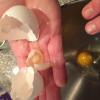Questioning intentions and academia
By Emily KingsleySeptember 27, 2016 - 00:56

This is a long and winding exploration of some thoughts and concepts that have been on my mind for a while. The post centers around questions of intention in social justice work—why we do what we do and how (seemingly good) intentions might actually be damaging. I also write about sociology and academia, thinking about how these institutions can promote injustice even while purporting to fight against it.









